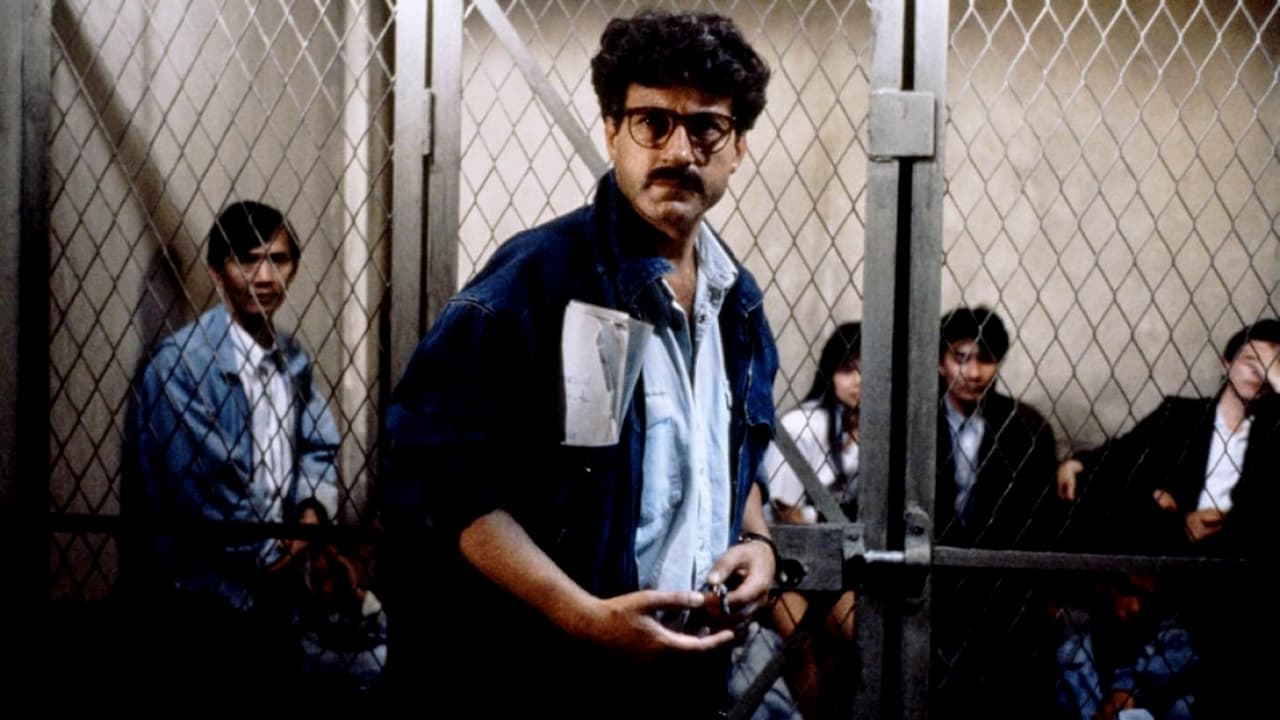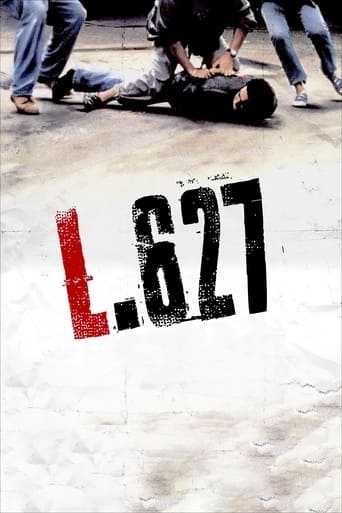

If one were to ever question where we, as American audiences, get our prime-time television ideas, it should never be considered original, or genius, or groundbreaking it should be simply coined, "borrowed". As we see popularity with such shows as "The Office" or the most recent "Life on Mars", we seem to be gobbling up popular programs from across the pond at the speed of light, and oddly more and more seem to feel less authentic. Sure, the actual conversations and dynamic dilemmas that occur each episode my be home-grown, but the idea it is the original idea that should be coveted. It would be equal to saying that you love DSL without ever experiencing dial-up how can you compare? Recently, I was able to scrounge around and discover a VHS that may, upon first viewing, seem like a hodgepodge of police interferences within the confines of Paris, but look deeper. Does our heroine, a tough, never by the book-paper pushing detective whom isn't afraid to corrupt the system to get results, a cop who isn't afraid to have a wife, but also a prostitute informant on the side? Wouldn't you agree that perhaps I am explaining the life of Vic Mackey from "The Shield"? Yet, I am not I am talking about Lulu, our Parisian officer in the outstanding "L.627".Lost within the conversion from VHS to DVD, this obscure title has not seen the light of day for a long time; in fact, you could probably find this at a yard sale for less than a dollar. If this is ever the case, pick it up and buy it it is worth viewing at least once to demonstrate the raw grittiness of police work. It has never been a colorful position, despite the humorous depiction in "Police Academy", and director Bertrand Tavernier knows how to push the envelope to such an extent that our fictional officer's cause affects the reason. They want drug off the streets, Lulu is constantly pushing his girlfriend to stop using drugs, but the means are not readily available. With broken police vehicles, pranksters instead of officers, lacking budget with technology, Lulu and Company are forced to take measures into their own hands. They fight crime, perhaps not the way the officer handbook suggests, but they fight crime. One scene that specifically stands out is one where Lulu is about to bust a dealer/supplier in a nearby park, he uses a nearby school to ensure that they are able to see the transaction take place. They are able to find an empty room, but the principal doesn't want them in the school contradictory to the ideals that schools want drugs off the street. There was this sense of animosity between person and officer as if the principal didn't believe that our officers would actually do anything of value. This was a small, yet shocking scene that defines Tavernier's central theme.Does Lulu get the drugs off the streets? Does he finally get the funding that he wants? Does his personally life collide with his cop life? These are all questions that Tavernier answers with small, seemingly insignificant scenes. There is a perfect ending scene that resonates within my mind between Lulu and his prostitute sideline. It demonstrates the quality of Lulu's work, and summarizes this film in a small 10-minute scene. That seems to be Tavernier's trademark with this film. A full range of quality small scenes that tie our characters together. Individually, this is a rather bland film difficult to begin and even longer to finish with nearly 2 ½ hours of play time, but intertwined, these scenes speak about the Parisian police force. "L.627" is a film that resonates within the mind. Oddly, I recently finished watching "La Haine" for the first time, and could argue that this is Tavernier's counter-discussion. Here, he shows why there may be police racism, why the law uses brutality, and why frustration between officers reigns supreme. Kassovitz's film gives us the counter-point, the view from the poverty on the streets.Overall, does "L.627" demand repeat viewing? Is it wronged not to have a DVD release? These are all important questions, but the answer is not readily available. "L.627" demonstrates powerful acting, documentary-esquire camera work, and a chilling theme, but the honesty lies within Tavernier's storytelling. While Lulu is our central character, this isn't a story about him. We don't have an emotional roller-coaster of a film where our hero redeems himself at the end. This isn't a Hollywood movie. In "L.627" social commentary is king, and we, as outsiders looking in, must just absorb the honest nature of the film. It is a tale of good corruption, hard working individuals, and the hardships of control. This will not be a film for everyone, but those privy enough to catch a viewing of this film will be impressed by every element of this film. From the filming to the unequivocal truths, "L.627" is a film to absorb. I am just sorry that I didn't see this film sooner.Always remember, instead of WWVMD? (aka What Would Vic Mackey Do?) try thinking of WWLD? (aka What Would Lulu Do?).Grade: **** out of *****
... View MoreIt's unfortunate that at first glance the leading character Lulu (Didier Bezace) looks like someone wearing a Groucho Marx mask in order to rob a bank but once you realize that that's how Bezace actually LOOKS you can settle down to enjoy what is essentially a lightly fictionalized documentary chronicling the uphill struggle of a Parisian narcotics squad who can do little more than shovel sand against the tide. Tavernier recently spoke about the backlash against this film on its release at a Masterclass he gave in London during which he said that the very police who had condemned him in public later came to him in private and told him they had been coerced by their superiors into attacking the film whilst actually in watching it they felt as if they had done two hours of overtime. That is, of course, a fine testimony but it doesn't necessarily mean that the non-professional viewer will echo it. As it happens it IS a very entertaining and involving movie that shows just how frustrating police work can be in a modern society. Lacking a real storyline it builds its effects by portraying the routine, form-filling, small triumphs, large disappointments. Another great film from a great filmmaker.
... View MoreTavernier's examination of the Paris police's losing battle against the drug-dealers was reportedly inspired by the experience of his son's addiction. It is an angry, despairing film. Early on the central character says that "all drug-dealers are terrorists" and later the police chief says that "my son is 13. He will have already met his first dealer".This is a documentary-style examination from the front-line, where the police are demoralised, under-resourced, corrupt and incompetent. The 'hero', Lulu, (an outstanding performance by Didier Bezace) is a maverick detective who gets transferred to desk duties when he is angered by his drunken boss demanding the return of the unit's van in the middle of a stakeout - so he can go home! After struggling with the police station's incompetent bureaucracy, Lulu is placed in a new anti-drugs unit, led by practical joker Dodo, concerned only with filling in forms and meeting the Ministry's statistical targets.The whole film rings true, right down to the tedious form-filling using old typewriters and stolen carbon-paper. There is no real plot, as the unit stumbles from disaster to disaster, but rather a series of incidents punctuated by much eating and drinking. As if to contrast with the chaos of the police unit, the film is shot calmly and lucidly by Tavernier. By the end of the film you have become involved with the characters and want to know more about their bleak futures. A wonderful film, and as good a portrait of policing (at its worst) as you will see.
... View MoreThe story is about policemen who work in a "commissariat" in Paris, France. They have to do their job everyday, running after little robbers or little drug dealers... The movie is very far from police stories we can see everyday in others movies, with great detectives, mafias... In fact, Bertrand Tavernier, with the help of an ancient policeman for the scenario, tries to catch policemen every day work, with their little problems with the hierarchy... I think this movie is the most "real" about police problems in France.
... View More